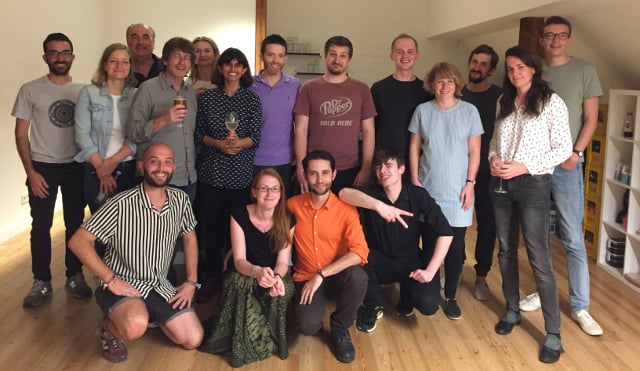Berlin is one of Europe’s biggest and most vibrant cities, with a top-class tech scene that’s churning out a new startup every 20 minutes.
But if you don’t have a computer science or engineering degree, it’s easy to feel left out of the action.
Learn skills that get you hired
As it turns out, learning to code doesn’t have to require years of training.
Instead, you can learn the most in-demand programming languages – and learn them fast – at SPICED Academy’s programming bootcamps in Berlin.
For Brazil-born Guilherme, a civil engineer who always enjoyed fiddling with computers, SPICED Academy’s Full Stack Web Development course delivered almost immediate results.
“After I finished the bootcamp, I started to look for a job. Just one month later, I was hired by Dots Software in Berlin as a software developer,” he explains. “It’s like a shortcut to get a job and learn how to code.”
Click here for more information about SPICED Academy
The intensive course is taught by skilled professionals who have worked with some of the world’s leading tech companies. Learning is accelerated, so after 12 weeks at the bootcamp you’ll be ready to start a creative and challenging career as a software engineer.
Also — if you are already registered as unemployed in Germany you may be able to attend SPICED Academy’s Full-Stack Web Development course for free. Learn more by clicking here.
Learn to think like a programmer
You’ll get to grips with the most popular scripting language, JavaScript, which is used by all major web browsers, as well as in-demand programming languages including HTML & CSS, MVC Frameworks and Node.js.
Equally important is SPICED Academy’s focus on helping students develop critical thinking, computational, and problem-solving skills.
By building real-world, production-ready web applications throughout the 12 week programme, students graduate with a portfolio of applications as well as hands-on experience applying the critical thinking skills they’ll need to excel in their careers and in life.
With your new skills you’ll be a strong candidate for a tech job in Berlin, or with companies in other cities where coding skills are in high demand.
Dedicated teachers
Working in groups and individually, you’ll tackle real-world problems that prepare you for the reality of your new career.
“The biggest challenge for me was the change of mind set,” says SPICED alum Rafael, an architect who realized he needed coding skills to “make my ideas come to life”.
Now at Pivii Technologies, a Berlin-based startup that makes images measurable, he credits SPICED instructors with helping him better understand how the internet and algorithms work.
“Some particular projects were challenging, but the team was always very helpful and very friendly, and I never went home with a question unanswered,” he adds.
Great instructors at SPICED also helped Mike transition away from an unsatisfying career as a banker into a engineering role at audio streaming platform SoundCloud.
“The dedicated teachers and staff were always available and willing to assist with any issues, be they related to coding or even just settling in,” he explains.
Lean more about SPICED Academy coding bootcamps in Berlin
But the guidance doesn’t stop with your new tech skills and helping you to feel at-home in the city.
Throughout the course, you’ll get advice on your profile, interview, and communication skills, as well as access to SPICED’s business network that’s always looking for new talent. So by the time you’re ready to apply for jobs, you’ll be fully prepped for the recruitment process.
Why study in Berlin?
Having worked in marketing and business development, recent SPICED graduate Karen arrived in Berlin after growing tired of watching software developer colleagues come up with ideas and make them a reality while she simply “sat on the sidelines”.
“It’s a really great programme to go to especially for Americans looking to do a bootcamp abroad; you don’t even have to worry about getting a visa to be here,” says Karen, who now works as a Product Owner and Developer at geeny.io.
“Being from the States, I couldn’t really afford another four years in school and out of the job industry.”
The SPICED programme is intense, but when you're not busy coding you can spend time soaking up the city’s history and culture in the wide assortment of bars, restaurants, cafes, and shops you’ll find on Berlin’s atmospheric streets. Berlin is packed full of must-see museums, world-class galleries, and some of the best attractions anywhere.
It's also cheaper to live in Berlin compared to many other big cities across the globe.
“Berlin is a fantastic location,” adds Karen. “You can actually afford to enjoy your Friday night.”
Think you’re ready to kickstart your coding career in Berlin?
Visit SPICED Academy for more information about upcoming courses and application deadlines.
This article was produced by The Local's Client Studio and sponsored by SPICED Academy.



 Please whitelist us to continue reading.
Please whitelist us to continue reading.